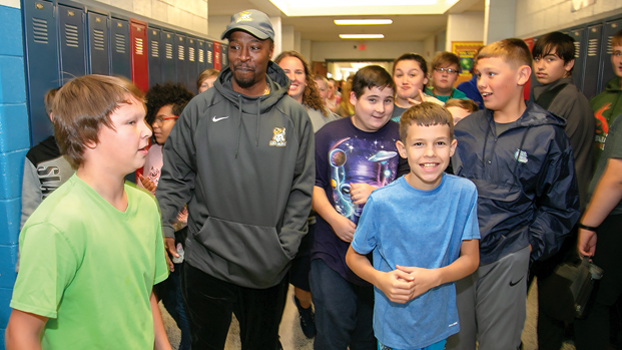Keith “Mister” Jennings tells students academics and dedication are the keys to success
Published 8:25 am Friday, October 26, 2018

- Star Photo/Larry N. Souders Hampton Middle School students escort Keith “Mister” Jennings through the hall to the classroom he would be speaking in.
East Tennessee State University legend and NBA basketball player Keith “Mister” Jennings paid a visit to the class of Tim Hall at Hampton Elementary to talk to them about what it took to reach their dreams Tuesday.
Hall was a graduate assistant when Jennings was playing ball at East Tennessee State and said he had made a promise to visit his classroom some years back.
As a part of his introduction of “Mister” Hall told his seventh class that he was possibly the greatest basketball player ever at East Tennessee State. Jennings was a four-year starter, and he still ranks No. 4 all-time on the NCAA career list for assists (983), he finished his career at No. 2 all-time on the ETSU scoring list with 1,988 points, shot 59 percent from the floor and he is still ranked second all-time on the NCAA career list for 3-point field goal percentage at 49.3 percent of his shots from beyond the arc.
Trending
In addition, he was selected as the Southern Conference Player of the Year, the Southern Conference Tournament MVP, and was named All-America by the National Association of Basketball Coaches, the U.S. Basketball Writers Association, and the Associated Press. He was the 1991 Naismith Award winner, an award that goes to the best under six foot player, standing at 5’7” tall.
Though not drafted, he played in the NBA for four years, three with the Golden State Warriors (92-95) and the 96-97 season for the Denver Nuggets. A knee injury cut short his NBA career, and after going through rehab for not one but two ACL tears, one in each knee, Jennings went on to play in Europe.
“Mister” started his conversation with the class by telling them when given the opportunity to speak to a class, he wants to talk about two things, academics and dedication.
He said that he was not that much of a student, saying he sometimes struggled with keeping his grades up, but spoke about how proud he was of his daughter and son who are both straight W students.
Speaking as a college level head coach, he told the class about how when a coach is out recruiting a future player, they do not just look at their accomplishments on the court but also look at their scholastic achievements, too.
“Coaches like to see who was or was not serious in the classroom. We like to see who was working hard and who wasn’t,” he said.
Trending
He said that coaches not only look at a player’s GPA (grade point average) in high school but they go back sometimes as far as the seventh grade, eighth grade, ninth grade to see how they did then.
He stressed how important making good grades all the way through middle and high school were important not only for someone who wanted to play basketball, or any sport for matter, but how important they are in life.
He spoke about how he had left East Tennessee State to pursue a career in the NBA without finishing his senior year, and how disappointed both his parents were about that decision.
“Back in the day I didn’t understand the importance of getting that “sheepskin” was to advancing my career after my playing days were done,” he said.
“I made a promise to my mom that I would finish my college education and get that diploma.”
So in the fall of 2007, after coaching three years at Highland School in Warrenton, Virginia, Jennings joined the staff at his alma mater, East Tennessee State, under then-coach Murry Bartow as a graduate assistant coach for the 2007–08 season while he completed his degree.
From there, Jennings spent a year as an assistant coach at Science Hill High School in Johnson City. Jennings was then an assistant coach at Bluefield College in Bluefield, Virginia from 2009-2014.
In 2014, he became assistant coach at Lees–McRae College in Banner Elk, North Carolina, and in July of 2017 Jennings was named the new head coach of the Lees-McRae College women’s basketball program.
He told the class how he never would have been able to achieve any of these jobs without a college degree.
All throughout his conversation Jennings talked about dedication to being the best player he could possible be. He told the class about how he started to dream about playing in the NBA in the sixth grade.
“People looked at me like you too short, you too small to play in the NBA,” he said. “But when you dream something don’t ever let somebody take that dream away.”
He said his senior year, when he wanted to go play for a college, nobody tried to recruit him. Being from Culpepper, Virginia, he said he had hope to play for the University of Virginia or Maryland, but nobody from either of those schools came calling.
At the end East Tennessee State came and offered him a full scholarship. He said a full scholarship meant he could attend school, play basketball and not have to pay for any of it.
He said playing basketball was the only way that he would have been to college because his parents did not have the money to send him to school.
Jennings went on to talk about winning the Naismith Award in his senior year even as people continue to tell him he was too small.
“That award means you’re the best player in the country under six feet tall,” he said. “Now how did that happen? I worked extremely hard on my game. I was always trying to figure out how to get better as a basketball player.”
He said he understood conditioning was very important.
“I was up every morning at 6 a.m. to go jogging about a mile to a mile and a half. Our driveway was not paved. It was dusty and had rock on it, but I stayed out there until I made my 200 jump shots. My younger brother would rebound it and pass it to me. I just stayed out there doing it, and the next thing you know, when I am at East Tennessee State, I am the kind of guy who believes that ‘if it ain’t broke don’t fix it.’”
He talked about how when he got there and played against bigger and better players, he still kept to the same regimented work out, so by senior year, he had results.
“I was the best player in the country under six feet. Now I shot the ball pretty good, now in today’s game if you shoot 45, 47 percent from the three point line you are a great shooter. My senior year I shot 59 percent from the three, that is a big difference.”
After that, he said his ego got the better of him.
He said it got so bad he stopped going to class his senior year, even withdrawing from college. He stopped going to team meetings and only concentrated on going to the NBA.
It was just about being a basketball player, and when he was invited to go try out for the Indiana Pacers, he was cut.
He said that was the first time he had ever been cut from a team, so he went to Europe and played a year there.
While on a trip to California on the last game of that tour, Ed Gregory, the Player Personal Director from Golden State, spotted him playing and invited him to come try-out for their summer league team.
Through a lot of hard work and dedication while on the summer league team, he said the then head coach of the Golden State Warriors, Don Nelson, invited him to come tryout for the team with the veterans. He had finally achieved his dream of being an NBA player.
After he finished his program, he opened the floor to questions. One of the first questions asked was how he got the nickname “Mister.”
He told a story about how he was playing little league football when he was seven years old, and after practice one day his father had come to pick him up. He said he was joking around with his teammates as his father was hollering for him to come to the car.
“After a couple of minutes, my dad got tired of waiting, put his hands up to his mouth and in a very loud voice call out, ‘Mister Jennings, get over here.’ All my friends were like, ‘Your dad calls you ‘Mister?’, and I was like ‘Yeah, yeah he does.’”
He said from there on out all his friends and teammates started calling him “Mister.”
During the course of his lecture, he said he had written a book about his years at East Tennessee State and was now in the process of making a documentary. The film follows Jennings and his teammates through his years featuring the “Old Men.”
It is about how ETSU was one of the few programs to ever make it to the NCAA “March Madness” Tournament with a behind-the-scenes look at those teams, and as of this writing it doesn’t have a firm title.
He also promised to return to Hampton Middle School to do a camp-style day of practice for both the boys and girls basketball teams in the near future.
For those looking to pursue the sport for their own careers, he had some advice.
“First of all you can’t be a quitter, you can’t quit,” he said. If you really want your dream, you got to go after it. You got go after it because other people are going after it too. At some point it is going to become a competition, and then it is going to be who wants their dream more.”





